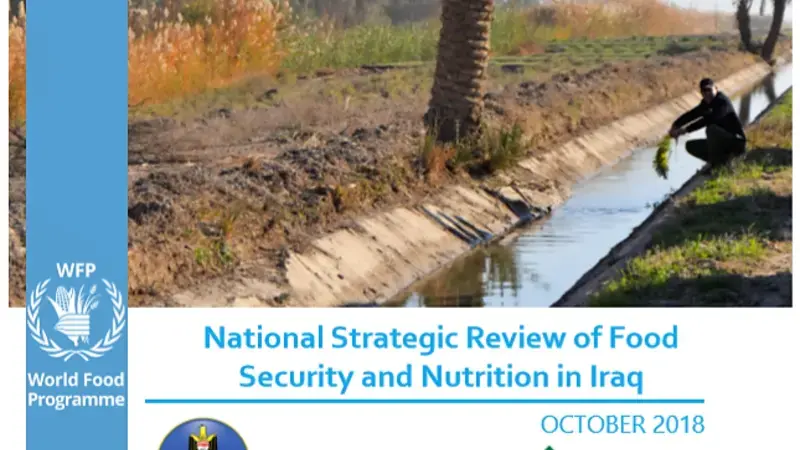Strategic Review targets Zero Hunger in Iraq

A national strategic review written by ICARDA in collaboration with the Government of Iraq, which aims to transform the country’s agricultural sector and address worrying levels of food insecurity and malnutrition, is now available online.
Working on behalf of the World Food Program – which delegated responsibility to ICARDA because of its intimate knowledge of Iraq’s agricultural sector and close partnerships with Iraqi officials and researchers - the Center contributed a set of policies, institutional changes, and investments that are designed to support Iraq’s implementation of Sustainable Development Goal (SDG) 2 (End hunger, achieve food security and improved nutrition, and promote sustainable agriculture).
The ‘National Strategic Review of Food Security and Nutrition in Iraq’ is the first assessment of its kind in Iraq to comprehensively discuss, synthesize, and prioritize actions that meet response gaps and accelerate progress towards SDG 2 targets.
Although Iraq has made significant progress on several human development and health indicators, and overall food supplies are adequate, food security and nutrition continue to challenge public health and livelihoods in poorer and conflict-affected governorates.
The main driver of food insecurity and malnutrition is poverty, which affects some 22.5 percent of the population nationwide, but can reach 40 percent in some areas. An estimated 30 percent of the population is also at risk of falling into poverty and food insecurity, and it is estimated that between 2002 and 2016 the number of undernourished people increased from 6.5 million to 10.1 million. Today, the severity of wasting is also high, particularly among women and children under the age of five.
In response, the Strategic Review adopts an integrated and cross-sectoral approach that goes beyond a singular focus on agriculture to also consider health, education, and social development. Its five priorities are:
- Improving safety net instruments – including the adoption of secure digital protection information systems; diversifying sources of funding; and improving the performance of social safety net procedures
- Addressing the burden of poor nutrition – promoting public-private partnerships and strengthening monitoring systems
- Increasing employment – especially among youth and women through increased investments in cooperatives and business incubators; efforts to promote the growth of businesses; and alternative educational approaches
- Enhancing sustainable agricultural production – including a focus on local priorities and stronger public investments in rural livelihoods, diversification, and adaptive seed systems
- Reforming marketing, trade and pricing policies –including more efficient and transparent food markets; enhanced market effectiveness; and more rational government interventions in commodity prices.
The implementation of the five action areas is expected to require an average annual investment of 1,588 billion Iraqi Dinars (IQD) (US$ 1.3 billion), of which the bulk would be for high priority repair and upgrading of infrastructure for the agriculture sector. In addition to investment costs, there will be an annual recurrent cost of IQD 2767.0 billion (US$ 2.3 billion), of which IQD 2386.2 billion (US$ 2.0 billion) would be required to cover the operation of a social safety net.
Commenting on ICARDA’s contribution to the Strategic Review, Aly Abousabaa, Director General of ICARDA, said: “More than 40 years of scientific work with research for development and presence in the region, has made ICARDA a key player in terms of scientific capacity, partnerships, and infrastructure. We have built a comprehensive network of diverse stakeholders and expertise that we can avail in a range of contexts.”
Mr. Abousabaa continued: “Being able to contribute to the development of an assessment and knowledge base as the National Strategic Review of Food Security and Nutrition in Iraq is an example of the type of services that ICARDA is increasingly exploring as part of our decentralized structure and approach.”
The 2018 National Strategic National Strategic Review of Food Security and Nutrition in Iraq:
For more information about ICARDA, please contact [email protected]
For more information about the report, please contact ICARDA’s Senior Natural Resources Economist Boubaker Dhehibi [email protected]
